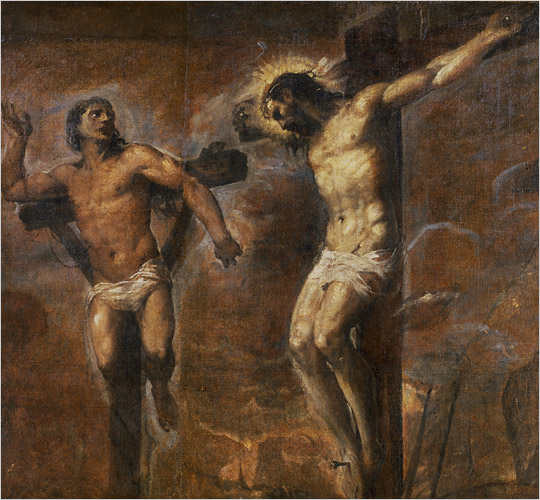Luke 23
Pilate releases Him to be crucified
Luke 23
13 And Pilate, having called together the chief priests, and the rulers, and the people,
14 said to them, You have brought to me this Man as one who turns away the people, and behold, I, having examined Him before you, have found no guilt in this Man concerning those things of which you accuse Him.
15 But neither did Herod, for I sent you to him, and behold, nothing worthy of death has been committed by Him.
16 Therefore, having chastised Him, I will release Him.
17 And of necessity he must release one to them at the festival.
18 But they cried out all at once, saying, Take this Man away, and release unto us Barabbas—
19 who for a certain insurrection which was made in the city, and murder, had been cast into prison.
20 Again, therefore, Pilate summoned them, wanting to release Jesus.
21 But they cried out, saying, Crucify, crucify Him!
22 And he said to them a third time, Why? What evil has He done? I have found no guilt of death in Him; therefore, having chastised Him, I will release Him.
23 But they pressed upon him with loud voices, asking that He might be crucified; and the voices of them and of the chief priests prevailed;
24 and Pilate assented that it should be as they required.
25 And he released to them him who for insurrection and murder had been cast into prison, for whom they had asked; but he delivered up Jesus to their will.
AC 1573:8. The Lord had no evil that was actual, or His own, as He also says in John: Which of you convicted Me of sin? (John 8:46).
AC 3400. That “guilt” means blame or imputation of sin and of transgression against good and truth becomes clear from those places in the Word where “guilt” is mentioned and also described, as in Isaiah,
Jehovah was willing to bruise Him and make Him imperfect. If Thou makest His soul [full of] guilt, He will see His seed, He will prolong His days, and the will of Jehovah will prosper by His hand. Isa. 53:10.
This refers to the Lord. “Making His soul [full of] guilt” is sin imputed to Him and so for blame laid on Him by those who hated Him. Not that He drew any sin at all to Himself, to bear it away….
AC 3400:2. “Guilt” accordingly stands for all sin that remains. The separation of it by means of good from the Lord is redemption….
AC 9069. …To see and to understand that a thing is evil, and still to do it, makes a man guilty, as the Lord teaches in John:
The Pharisees said, Are we also blind? Jesus said to them, If you were blind, you would not have sin; but now you say, We see; therefore your sin remains (John 9:40, 41).
DP 294:4. Since, then, man is not willing to know that he is led to think by others, but wishes to think from himself, and believes that he does so, it follows that he is blamable; nor can he rid himself of blame so long as he loves to think what he is thinking. But as soon as he ceases to love this, he releases himself from this bond to others. This takes place when he knows that a thing is evil, and wishes in consequence to shun it and refrain from it. And then he is taken away by the Lord from the society that is in that evil, and is transferred to a society that is not in that evil. But if he knows that evil and does not shun it, the blame is imputed to him and he becomes guilty of that evil. Anything, therefore, that a man believes that he does from himself is said to be done from him, and not from the Lord.
AR 224:10e. Everyone incurs guilt who believes that he acts from himself, whether it is good, or whether it is evil. But he does not incur guilt who believes that he acts as from himself.
Questions and Comments
- Can you think of another time in history when people released or celebrated a criminal like Barabbas at the expense of an honest man?
- To be guilty, a person must do evil from both will and understanding, that is, because he really wants to even though he knows that it is wrong. Part of repentance is to “make oneself guilty” of one’s sins, that is, to take responsibility, and then to stop doing them.
- If we truly believed that all our affections flow into us out of the spiritual world, how would that help us to be not guilty?
| previous |  |
next |
|---|


